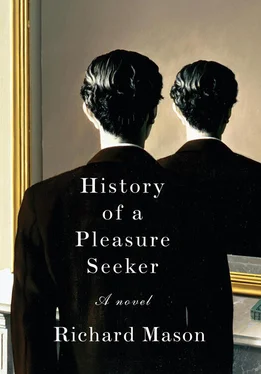“Sorry.” But Piet had no energy for embarrassment.
Didier finished drying and put on his dressing gown. “Do ask your friend if she needs anyone else to lend a hand.”
“Of course.” Piet closed his eyes again. He was no longer feeling loquacious and wanted Didier to leave.
“ Bonne nuit , then.”
“Good night, my friend.”
Didier went to his room, pulled the table across the door, hoarding the memory of what he had seen, opened the window and lay on the bed. He understood the merits of delay and did not touch himself for five long minutes while he thought over what had just happened and improved upon it — so that when he began his long, slow frig in the hush of a summer’s night, Piet Barol not only repeated his performance in the bath but put his strong arms around Didier’s shoulders and stroked the back of his neck with his fingers and looked deep into his eyes and kissed him.
Meanwhile Piet refilled the bath— hot this time — and washed and went to bed, entertaining the tired protests of his conscience and resolving to be better, without at all intending to honor this promise.
After this, Piet Barol began to omit his daily ritual of feigned regret. It seemed a pity to squander an instant of that glorious summer on self-recrimination, so he sedated his scruples and threw himself into sampling the many pleasures available to him while Maarten Vermeulen-Sickerts was in America.
He thought less and less of his life in Leiden and grew bolder in his explorations, sometimes leaving Egbert with a translation for two hours at a stretch while he sketched in the shuttered ballroom the superb Louis XV furniture, or the silver table ornaments reserved for Christmas and baptisms. Every piece Maarten had bought was the product of masterly labor. The delicate butterflies and dancing bears engraved on a glass goblet of the sixteenth century had the power to move Piet to tears. So did the fact that Maarten owned seventy-eight such glasses and kept them in a cabinet, redolent of intrigue and secret treaties, that had once belonged to a doge of Venice.
Piet no longer felt embarrassed to be caught in contemplation of the family’s possessions. At last he was at ease with the girls and immune from the disapproval of the servants thanks to the protection of Jacobina. Nevertheless, because it made him happy to be well liked, he continued to dispense his good nature without regard to rank or influence; and so became rather a favorite with Mrs. de Leeuw, who was not used to university men taking the trouble to inquire after her mother’s health, still less to them remembering her ailments from week to week.
Egbert’s docility in the matter of translation exercises was commendable. When Piet understood that his charge would not attempt to leave the schoolroom once he had reached it, he began to add other pursuits to his sketch making. It pleased him to volunteer his services to Jacobina in front of the other servants and to provoke the frown she always wore when setting the date and time of their next appointment. Though he imagined doing so often, he never undressed in front of her nor pretended to any further intimacy than that of a discreet and unusually obliging body servant. She, however, became a great deal more particular in her requirements, which she continued to articulate in the tone she used when she outlined a menu to Monsieur la Chaume or asked Hilde Wilken to clear the tea things. Permitted such quantities of supervised experimentation, Piet began to see that the way to sensual Nirvana is long, and that even an inch of the journey, properly savored, can give two people more pleasure than many enjoy in a lifetime.
As satisfying to him was the social intimacy he had achieved with Constance and Louisa, who now included him in the tête-à-têtes that took place in the summerhouse at the end of the garden where Louisa kept her mannequins and toiles and gave commands to seamstresses and milliners. She did not make any effort to contribute practically to her creations, and Piet admired the way she took for granted that others should labor to give life to her imaginings. She knew her own mind well and was a severe critic. Twice, while her sister and Piet played trictrac, she reduced to tears a middle-aged embroiderer who had failed to catch a pattern of ivy, clambering over a ruin, that she had designed for a coat inspired by Arthurian legend.
Like her father, Louisa had no patience with incompetents. The third time the embroiderer made a mistake, she never appeared again. Once or twice Piet wondered what had happened to her. Presumably she had a family to feed, but such quotidian pressures were so far from life as it was lived at Herengracht 605 that he never remembered to inquire.
Didier remained hilarious on the subject of the girls’ extravagances and reported numerous instances of petulance. But they were only rude to servants. Now that Piet had graduated to the status of guest, he saw only their most charming sides. He and Didier did not share a bath again or refer in any way to the events of their first one together, but they continued to use each other’s water and exchange gossip from the vantage point of the radiator; and when Didier smiled into Piet’s eyes as he served him coffee, or ice-cold lemonade, Piet smiled back.
On July 17th, Maarten Vermeulen-Sickerts returned from New York in low spirits. It was the first time he had gone into partnership with Americans and he had not enjoyed the experience. He had never met such uncontainable enthusiasm — for yet another story, another elevator shaft, another eighty thousand dollars spent on frescoes and gilt. More than a thousand crystal chandeliers had already been installed, and apparently a further six hundred were required. The project was likely to finish late and certain to cost much more than he had anticipated.
Maarten had well-established lines of credit, but just at the moment his finances were rather tighter than usual. His hotel on the shores of Lake Como was not doing well. The resort had fallen abruptly out of fashion a few months after it was finished. His establishments in London and Frankfurt had required new lead roofs and been closed for six months, since he could not have patrons in a building filled with banging workmen.
Unlike his wife and daughters, Maarten Vermeulen-Sickerts had a keen sense of the value of money. Because he was honest he was prepared to charge his guests the sums he did only for an experience that was, in every way, perfect. He personally supervised the selection of the telephonists. He turned every tap, stayed in every Suite Impériale, tried the butter in every breakfast room to make sure it was soft but solid. He would rather close for a season than offer accommodations that were less than first rate. But to have closed his two most profitable hotels for the same season left him inconveniently short of funds, since the new one in New York, which his partner had decided to call the Plaza, was costing tens of thousands a week.
For some time, Maarten had been wondering whether God was punishing him for the venture’s worldliness. He had sanctioned the architect’s fancies from the other side of the Atlantic and visited to see the demolition of the existing building and the sinking of the new foundation’s cornerstone. But the Americans had built very quickly and on his second visit he had been shocked by the grandiloquence he had financed. To have built a Renaissance French château thousands of miles from the Loire Valley was one thing. To have presumed to improve on the original by inserting nineteen floors beneath its turrets was another and seemed worryingly close to what others had done with the Tower of Babel. That enterprise had brought ruin and discord to its overreaching builders, and it seemed to Maarten that this one might do so, too.
Читать дальше












